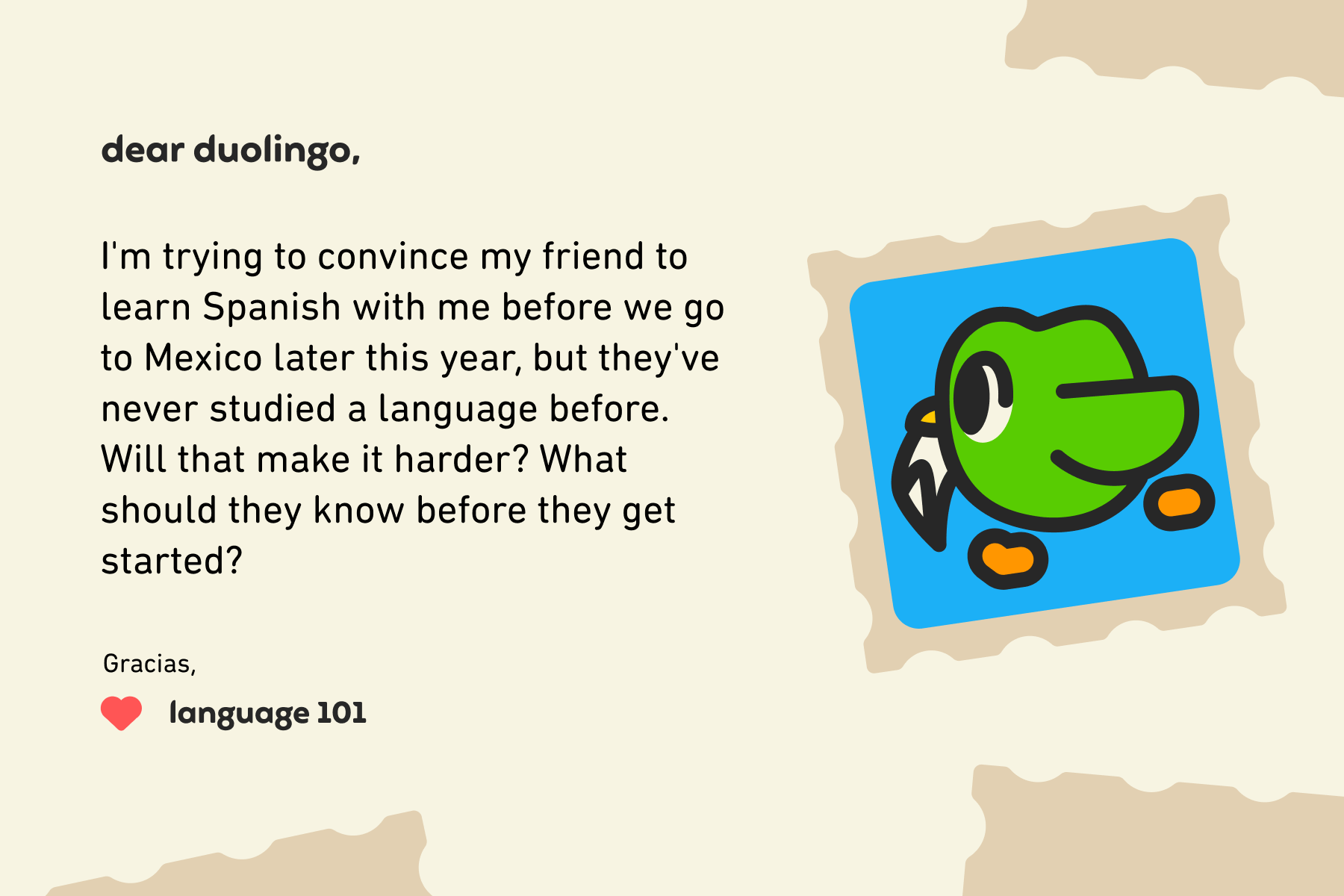Welcome to another week of Dear Duolingo, an advice column just for learners. Catch up on past installments here.
Happy New Year, learners! If one of your resolutions is to learn a language, you might have this week's question on your mind—even if you've studied other languages before.
Our question this week:

I'm so excited for your friend—it's so eye-opening to study a new language for the very first time! It's easy for experienced learners to forget just how different a new language can be, and I think there's a temptation to think of a language as just learning new words. Once you've learned a few languages, you and your brain are better prepared to anticipate the kinds of differences that exist across languages.
Here's what a new language learner should look out for:
Languages are more than just words.
When you learn a new language, you'll be studying many language components:
- Sounds: how to pronounce and understand sounds in the new language. You'll be retraining how your brain categorizes sounds!
- Vocabulary: how to express different meanings, especially through nouns, adjectives, and verbs.
- Grammar: how to combine that vocabulary, use connector words, and change word endings (or word prefixes!) to form ideas.
- Conversation rules: how to use sounds, vocabulary, and grammar appropriately depending on the situation and your goals.
And you'll be working on 4 language skills: reading, writing, speaking, and listening. Some are naturally easier than others for adult learners. It's normal for them to develop at different paces, too!
Not everything will "translate."
You'll find that many translations won't "match up" exactly between your own language and the one you're learning. Instead of translating single words at a time, it'll be better (and more accurate) to translate ideas and concepts.
For example, to say I am hungry in Spanish, you don't actually translate "I," "am," and "hungry." Those words all exist in Spanish, but it's just not the way you express being hungry. Instead, in Spanish, you have hunger: You'll say Tengo hambre (literally, "I have hunger").
You might ask yourself *why* Spanish doesn't say that you *are* hungry—but Spanish speakers could just as easily ask why we don't *have* hunger in English! 🤷♀️ Neither language is "correct" or more logical… there are just many ways in the world's languages to express the same idea.
Meanings won't always match precisely.
Even in closely related languages, you'll often find that words and meanings won't match up 1:1, so your language might have just one word for something the new language has different words for, and sometimes your language will have 2 words and the new language just one!
In Romance languages, like Spanish, French, and Italian, there are different kinds of "knowing": You'll use one verb for knowing facts and information and a totally different verb to say you know a person or place. If you're an English speaker, this can feel like a weird distinction to make… but to a Romance language speaker, it can seem strange that English ignores the difference and uses a single word!
| To know information | To know a person or place | |
|---|---|---|
| Spanish | saber | conocer |
| French | savoir | connaître |
| Italian | sapere | conoscere |
Prepositions are especially likely to be mismatched across languages, so it's normal for them to give you a headache, too. There will also be differences in the connotations of words from one language to the next—the ideas associated with words, metaphorical uses, whether they sound formal, crude, or childlike, etc. Even colors can vary across languages!
Grammar can be so different.
For English speakers learning languages like Spanish and French, it's typical to think of "grammar" as the rules for word endings and verb conjugations… but there's a lot more where that came from! 😅 Here are more grammar-y things to look out for when learning a new language:
- Word order: These are rules about what order things go in. This is another way that translations aren't word-by-word—things can seem really scrambled in a different language!
- Agreement: This refers to the ways that words change to match other parts of a sentence. There's only a couple of ways that English words change (like we say I walk but she walks), but other languages will have different versions of words based on grammatical gender, number (is it one object? two? five? uncountable?), where it is in the sentence, what the noun refers to (an animal? a body part? something manufactured?), and more!
- Where changes occur: Languages can add information via prefixes (mini words that go before a word), suffixes (mini words that go at the end), infixes (mini words squished right into the middle of a word), and circumfixes (mini words that wrap around a word, at the beginning *and* the end). Many European languages rely on suffixes for agreement (like for conjugating verbs), but there are many other places where changes can happen!
- Connector words: These words serve a grammatical purpose but don't have a clear translation. You'll often encounter little words that are required to express an idea but that seem not to add new or specific information. Their purpose is just for the grammar! For example, the Spanish sentence Voy a comer con mi novio (I am going to eat with my boyfriend), the a is just a piece of grammar—it's required when you say you're "going to" do something, and it doesn't have a separate, literal meaning… it's just how you have to say it in Spanish! It's best not to overthink connector words or try to rationalize them.
Let the games begin!
Language learning is such a fun way to connect with the people and cultures we care about and challenge our brain—and now you know what to look for as you begin your own learning journey!
For more answers to your language and learning questions, get in touch with us by emailing dearduolingo@duolingo.com.



